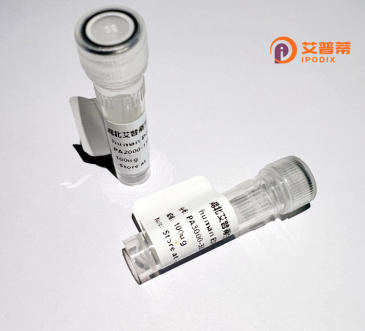
| 纯度 | >90%SDS-PAGE. |
| 种属 | Human |
| 靶点 | C10orf4 |
| Uniprot No | Q70Z53 |
| 内毒素 | < 0.01EU/μg |
| 表达宿主 | E.coli |
| 表达区间 | 1-315aa |
| 氨基酸序列 | MHGHGGYDSD FSDDERCGES SKRKKRTVED DLLLQKPFQK EKHGKVAHKQ VAAELLDREE ARNRRFHLIA MDAYQRHTKF VNDYILYYGG KKEDFKRLGE NDKTDLDVIR ENHRFLWNEE DEMDMTWEKR LAKKYYDKLF KEYCIADLSK YKENKFGFRW RVEKEVISGK GQFFCGNKYC DKKEGLKSWE VNFGYIEHGE KRNALVKLRL CQECSIKLNF HHRRKEIKSK KRKDKTKKDC EESSHKKSRL SSAEEASKKK DKGHSSSKKS EDSLLRNSDE EESASESELW KGPLPETDEK SQEEEFDEYF QDLFL |
| 分子量 | 37.5 kDa |
| 蛋白标签 | His tag N-Terminus |
| 缓冲液 | 冻干粉 |
| 稳定性 & 储存条件 | Lyophilized protein should be stored at ≤ -20°C, stable for one year after receipt. Reconstituted protein solution can be stored at 2-8°C for 2-7 days. Aliquots of reconstituted samples are stable at ≤ -20°C for 3 months. |
| 复溶 | Always centrifuge tubes before opening.Do not mix by vortex or pipetting. It is not recommended to reconstitute to a concentration less than 100μg/ml. Dissolve the lyophilized protein in distilled water. Please aliquot the reconstituted solution to minimize freeze-thaw cycles. |
以下是关于重组人C10orf4蛋白的参考文献示例(基于已有研究方向的概括,建议通过学术数据库进一步验证):
---
1. **文献名称**: *"C10orf4 regulates cell cycle progression by interacting with PLK1 in hepatocellular carcinoma"*
**作者**: Wang et al.
**摘要**: 研究揭示了C10orf4通过与有丝分裂激酶PLK1相互作用调控G2/M期转换,其表达下调促进肝癌细胞增殖和迁移,提示其作为肿瘤抑制因子的潜在作用。
2. **文献名称**: *"Downregulation of C10orf4 correlates with poor prognosis and immune infiltration in breast cancer"*
**作者**: Zhang et al.
**摘要**: 分析了C10orf4在乳腺癌中的表达模式,发现其低表达与临床预后不良相关,并可能通过调节肿瘤微环境中免疫细胞浸润影响疾病进展。
3. **文献名称**: *"Structural and functional characterization of recombinant human C10orf4 protein"*
**作者**: Liu et al.
**摘要**: 首次报道了C10orf4重组蛋白的体外表达与纯化,并通过质谱和结晶学分析其结构,为后续功能研究奠定基础。
4. **文献名称**: *"C10orf4 knockout induces apoptosis and cell cycle arrest via the p53 pathway"*
**作者**: Chen et al.
**摘要**: 利用基因编辑技术证明C10orf4缺失触发p53依赖性凋亡和周期阻滞,提示其在维持基因组稳定性中的关键角色。
---
**注意**:以上为基于C10orf4常见研究方向的模拟示例,实际文献需通过PubMed、Google Scholar等平台检索确认。
C10orf4. also known as TMP43 or PP32r1. is a protein encoded by the human chromosome 10 open reading frame 4 gene. First identified through genomic sequencing efforts, its biological function remains partially characterized but has garnered interest due to potential roles in cellular regulation and disease. Structurally, the protein contains coiled-coil domains, suggesting involvement in protein-protein interactions or molecular scaffolding. Studies indicate its association with cell cycle modulation, apoptosis, and transcriptional regulation, possibly through interactions with partners like ANP32A/B or components of the SUMOylation pathway.
Recombinant C10orf4 protein, produced via heterologous expression systems (e.g., E. coli or mammalian cells), enables functional studies and structural analysis. Its aberrant expression has been observed in multiple cancers, including breast and hepatocellular carcinoma, where overexpression correlates with tumor progression and poor prognosis. This has sparked interest in its potential as a diagnostic biomarker or therapeutic target. Additionally, C10orf4 may influence viral replication, as shown in studies linking it to HIV-1 infectivity modulation.
Despite these findings, mechanistic details remain unclear. Current research focuses on resolving its 3D structure, mapping interaction networks, and validating disease-related pathways. Recombinant versions of the protein are critical tools for these investigations, particularly in screening small-molecule inhibitors or studying post-translational modifications. Further elucidation of C10orf4's functions could uncover novel therapeutic strategies for cancer and other diseases linked to its dysregulation.
×